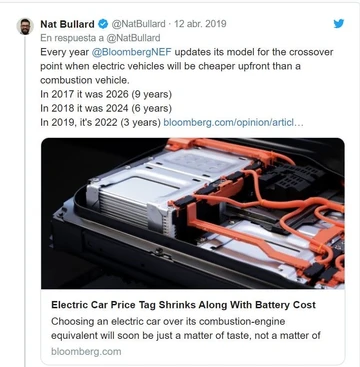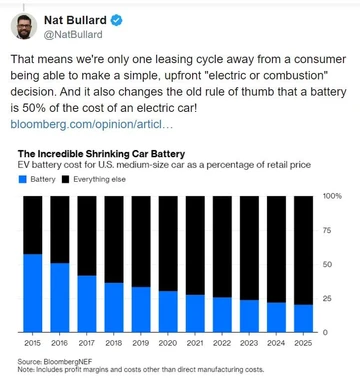In three years, the electric car will be cheaper than gasoline
The battery of the future: 965 km of autonomy for electric cars
Bloomberg advances to 2022 the point of parity between the price of an electric car and the price of a car with an equivalent combustion engine. First, it was 2029 (in 2017), then 2026 (in 2018) and for this year 2029 is the forecast of Bloomberg NEF. It will be in 2022 when electric cars will be cheaper than gasoline cars. Bloomberg NEF analysts base their calculations on the evolution of costs and especially on the price of the battery, the most expensive element of electric cars. The convergence point “will be a crucial moment for the electric vehicle industry” because the price factor will no longer enter the buyer’s equation, according to Bloomberg.
The key, the cost of the electric battery
Choosing an electric car over a gasoline one will increasingly be a matter of “taste, style, preference” or necessity, “but it will not be for a long time a matter of price” as it is to a large extent now.
According to Nathaniel Bullard, an analyst at Bloomberg NEF (New Energy Finance) in 2015, 50% of the cost of an electric car corresponded to the battery. That percentage is currently 33% and will fall to 20% in the middle of this decade. “Achieving parity in the initial cost means that the buying trend is close to leaning in favor of electric vehicles,” they say in Think Progress. “And it also means the beginning of decarbonization of much of the transport sector.”
It also lowers the price of engines and electronics
According to the results of the latest BloombergNEF study (BNEF) devoted to the evolution of their prices, lithium-ion traction batteries were traded on average at 156 dollars (140 euros) per kilowatt-hour during this year 2019.
-87% since 2010. As a logical consequence of the development of electric mobility, the price of lithium-ion traction batteries has dropped by 87% since 2010. That year, they were billed at around 1,100 dollars (991 euros) per kilowatt-hour.
In its projections, BNEF estimates that the unit will approach 100 dollars (90 euros) by 2023. Therefore, electric cars may no longer be more expensive than equivalent gasoline models. Electric vehicles offer numerous advantages over gasoline vehicles, beyond the environmental issue: among others, they have a better performance, are quieter and are costly to maintain by having less mechanical elements and less moving parts susceptible to breakdowns.
Although batteries are not exempt from the risk of an increase in price due to demand and the use of finite elements such as lithium, the technicians and technicians of the battery industry should mark a general trend towards cheaper, usual in the technology. In addition to the battery, other key elements of electric cars, such as motors, also record a reduction in costs due to increased production: “during the next decade, key components such as motors and electronics can be reduced by up to 30 %.”
To deep dive and stay continuously updated about the most recent global innovations in Energy Storage and learn more about applications in your industry, test drive WhatNext now!








Leave a Comment